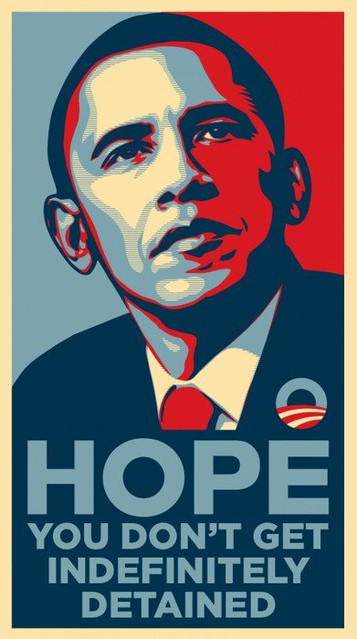"The right of the people to be secure... against unreasonable searches and seizures, shall not be violated, and no Warrants shall issue, but upon probable cause" ...unless you're traveling within 100 miles of the nation's borders, says the Department of Homeland Security.
The DHS' Office of Civil Rights and Civil Liberties recently released a report maintaining that people traveling within 100 miles of the U.S. border may have their electronic devices, such as laptops, seized and searched without suspicion.
The report was in response to concerns from the American Civil Liberties Union, which brought a case to New York federal court in 2010 on behalf of Pascal Abidor, a New York man whose laptop was seized and searched at an Amtrak inspection point near the Canadian border. After showing his U.S. passport to a federal agent at the checkpoint, Abidor was asked to go to the cafe car, where agents allegedly seized his laptop, forced him to enter his password, and questioned him about the photographs they found of Hamas and Hezbollah rallies. According to the lawsuit, Abidor tried to explain that "he was earning a doctoral degree at a Canadian university on the topic of the modern history of Shiites in Lebanon," but he was subsequently handcuffed and jailed for three hours while authorities continued to search his laptop.
 |
I don't hate Obama... I just think
this is funny.
|
The ACLU claims that the the search and seizure of electronic devices along the border without suspicion is a violation of the Fourth Amendment, arguing that such procedure should at least be subject to a higher threshold of justification--"reasonable suspicion." However, the DHS' report is in line with executive policy; the Bush administration established the "suspicionless electronics search rules" in 2008, and the Obama administration has essentially upheld the same principles.
In addition, legal precedent concurs (for the most part). The "border search exemption," an unofficial doctrine of U.S. legal interpretation, essentially assumes that searches and seizures at international borders do not require probable cause. However, it does stipulate that more invasive searches would require "some suspicion."
The lawsuit filed by the ACLU is still pending, so let's pretend that we're the ones making the constitutional judgments. Are suspicionless searches of electronic devices along U.S. borders unconstitutional? If so, to what threshold of justification (reasonable suspicion, probable cause) would such a search need to be held? If not, how can the government legally justify this limitation placed upon the Fourth Amendment? Does the potential threat to national security trump the potential loss of civil rights?
TL;DR? Fourth Amendment v. National Security. The feds can search your laptop without suspicion if you're within 100 miles of a U.S. border. Also, don't go to Florida.

4 comments:
This story is kind of ridiculous and shocking. Under the constitution, "suspicionless" searches are in NO WAY acceptable. Like any search and seizure, there should be at least probable or reasonable cause before anyone takes any measures against another citizen. In many ways this feels like Facebook's consistent privacy infringements. They keep encroaching on privacy rights until there is some cause for outrage which forces them to scale back a bit. Except in the case of the US government, scaling back policies and laws aren't as easy as posting outrage statuses on Facebook. I don't see there being any reason to make any exceptions to the Fourth Amendment, especially not in this case. Let's hope the Supreme Court sees it the same way (which they really should).
In the beginning of the Fourth Amendment, it states that it is "the right of the people to be secure in their persons, houses, papers, and effects, against unreasonable searches and seizures..." Considering that electronic devices (hopefully) constitute as "effects," I would argue that it is unconstitutional for authorities to search people's various electronic goods near the border of the country without reasonable suspicion or probable cause. For such searches (ones without warrants) to be considered acceptable, I believe that probable cause is an appropriate threshold because it implies that potential criminal charges are being taken into consideration upon searching an item.
With regards to the "national security versus a loss of civil rights" issue, I'd have to agree with Smita's perspective. I think the government will always put national security as one of its top priorities, and it won't become a bit more lax about protection until there's some sort of civil uproar. Moreover, considering how fearful and intolerant a lot of our population is towards anyone who has anything to do with the Middle-East (or really, almost any country besides those in Europe), I feel that part of the problem lies with our unconscious want of absolute security.
I agree with Smita and Abby that this is definitely an outrageous encroachment on our 4th Amendment Rights. However, I can see how our government could suspiciously justify their policy. Supposedly, we are currently involved in the "War on Terror." Perhaps the federal government could claim that they are acting in violation of the Constitution because it's war time, and anything goes during war, as proven by our dear friend Abe. But the United States' "War on Terror" is not an official, or concrete war. Therefore, I think it's reasonably obvious that our government is applying it's "war" powers a bit too loosely.
I'm saddened that our government has reached a "point of no return" on the issue national security. Lately, they have been so obsessed with national security that attempts to reduce it would be political suicide. Personally, I believe that all these encroachments on our rights are getting excessive and unnecessary. I also agree with Brandon's view on this so-called "war on terrorism." It's almost as if it is just a way to justify and extend our racism towards Middle Eastern people indefinitely.
Post a Comment